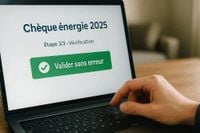The chèque énergie remains a vital support system for millions of French households with modest incomes in 2025, but significant changes are on the horizon. This state-provided aid helps eligible families cover their energy expenses, including electricity, gas, wood, fuel oil, and pellets, as well as certain energy renovation projects carried out by certified professionals.
In 2025, the amount of the energy check will range from €48 to €277, depending on the household's reference tax income (RFR) and the number of people living in the home, measured in consumption units (UC). However, two major adjustments are set to take effect this year that beneficiaries must be aware of.
Firstly, the payment schedule will be altered, with energy checks slated to be sent out starting in November 2025, compared to the previous April timeframe. This shift means that households will need to plan ahead for their energy expenses, as the checks will not arrive until later in the year.
Secondly, the eligibility criteria are changing. From now on, eligibility will be linked to the tax household of the electricity contract holder. This means that only individuals who are fiscally attached to the contract holder will be considered in the calculation, potentially excluding certain roommates or adult children still living at home. This change aims to streamline the process and ensure that the aid reaches those who need it most.
Fortunately, no action is required from eligible households to receive their energy check. Checks will be automatically mailed to the address registered with the tax administration, or the amount can be directly applied to the energy bill if pre-allocation has been selected. However, for those who prefer to apply manually, a new online portal will be available through the Agence de services et de paiement (ASP). To complete the application, households will need to provide the tax number of each member, an identification document, and an energy bill in the name of the contract holder.
Processing applications will take approximately one month, while postal requests may take up to two months. The 2025 energy check will be valid until March 31, 2026, is nominative, and cannot be transferred to another person. All energy suppliers and social landlords are required to accept it, and beneficiaries are advised to never share their bank details with anyone claiming to assist with the application.
In addition to the energy check, Engie, one of France's largest energy suppliers, has announced an exceptional discount of €50 for hundreds of thousands of households. This discount is part of a broader effort to alleviate the financial burden on families facing rising energy costs. To qualify for this bonus, households must have used their energy check in 2024 to pay an electricity or gas bill, and their contract must have been active as of November 30, 2024. If eligible, the €50 reduction will automatically appear on the next Engie bill, providing immediate relief without any additional steps required from the customer.
Engie's initiative is part of a larger commitment to support vulnerable households. The company has doubled its investment in the housing solidarity fund to €12 million in 2024, which helps families struggling to pay energy bills or facing housing-related expenses, such as moving or renovations. This financial support is crucial, especially as one in five French citizens reports difficulty in managing their energy bills.
As the energy check evolves in 2025, the government is also considering increasing income thresholds to include more beneficiaries. This adjustment aims to reflect the economic reality faced by many households today. Additionally, an online simulator will be made available to help individuals quickly assess their eligibility for the energy check from the comfort of their homes.
For those looking to make their homes more energy-efficient, the government plans to offer additional bonuses to cover a larger portion of the costs associated with adopting economical heating systems. These measures are designed to encourage sustainable energy practices and support the transition to greener energy solutions.
In summary, 2025 marks a pivotal year for the chèque énergie. With new eligibility rules and a delayed payment schedule, households are urged to stay informed and proactive about their applications. Utilizing the online simulator and understanding the changes will be key to ensuring that families can continue to benefit from this essential support. Whether you’re a long-time recipient or new to the program, now is the time to prepare and take advantage of the resources available.





